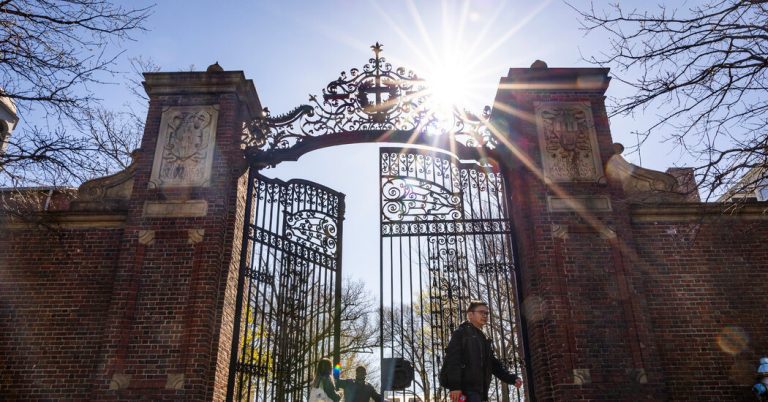Harvard said Tuesday it will now avoid taking positions on issues that are not “relevant to the core operation of the university,” accepting recommendations from a faculty committee that urged the university to dramatically scale back its messaging on issues of the day.
If put into practice, Harvard will no longer issue formal statements of empathy, as it did for Ukraine, after the Russian invasion, and for the victims of the Hamas attacks on Israel, for example, on October 7.
“In issuing formal statements of empathy, the university runs the risk of appearing to care more about some parties and events than others,” the report said. “And because few, if any, world events can be completely isolated from conflicting viewpoints, issuing official statements of empathy runs the risk of alienating some members of the community by expressing tacit solidarity with others.”
The university’s Institutional Voice Task Force, made up of eight faculty members, issued the report, with a set of principles and a proposed path forward, which the administration and board accepted.
“Harvard is not a government,” Noah Feldman, a Harvard law professor and co-chairman of the committee that developed the recommendations, said in an interview with The Harvard Gazette, published Tuesday as part of the university’s announcement. “It should not have a foreign or domestic policy.”
The report, however, did not fully embrace “institutional neutrality” — a principle promoted by the University of Chicago in which universities pledge to stay out of political and social issues. A number of universities, including Stanford and Northwestern universities, announced shortly after the Hamas attack that they would adopt the policy.
Mr. Feldman said that while the recommendations had some overlap with institutional neutrality, there were also differences.
A key difference, Mr. Feldman told The Gazette, is that “as an institution with values, we have a responsibility to advance our core function as an educational institution and to defend against forces that seek to undermine our academic values. In this sense, we are not neutral and we cannot be.”
In an interview, Mr. Feldman gave examples of when Harvard should weigh political issues. He cited a proposal by former President Donald J. Trump to collect “billions and billions of dollars” by taxing large private universities. Advocating for such a plan, he said, “would fall squarely within the function of the university.”
Mr. Feldman also noted that Harvard supported affirmative action in court and that the admissions policy “would count as a core function of the university.”
Tom Ginsburg, faculty director of the Forum on Free Research and Expression at the University of Chicago, said none of these examples contradicts Chicago’s stance on net neutrality. Still, he said, he supported Harvard’s new position.
One of the first sentences in the Harvard report says the university is not institutionally neutral, but then the rest of the report describes how it is committed to institutional neutrality, Mr. Ginsburg said.
“Their policies seem to be moving in the direction that many other schools have moved,” Mr. Ginsburg said. “But they don’t want to admit that.”
One reason for this, Mr. Ginsburg said, is that some parts of the academy see neutrality as a misleading term, with many believing that silence itself is taking a stand. Others consider it impossible.
“There is no such thing as institutional neutrality,” Peter Wood, president of the National Studies Association, said Tuesday. “Those who claim they are going to uphold it find a myriad of alternative positions in which they say, ‘but not in this case.’ When it comes to matters of political importance, universities will do what they have always done. Institutional neutrality is a false flag.”
For years, universities have issued, mostly without controversy, messages about any number of global and local events, from the Russian invasion of Ukraine to racism at home. But perhaps unlike any other issue, the Israeli-Palestinian conflict has divided university communities and made clear the downsides of such statements on highly controversial issues.
Harvard has come under fire for its communications following the October 7 Hamas attack on Israel.
Harvard, to some critics such as former university president Lawrence H. Summers, was woefully slow to denounce a pro-Palestinian letter by a student coalition that held “the Israeli regime entirely responsible for the unfolding violence.” Dr. Summers suggested that the vacuum left by Harvard’s slow response allowed the student’s statement to remain the university’s official position in some people’s minds.
After then-Harvard president Claudine Gay released a series of statements, including one condemning the “terrorist atrocities committed by Hamas” and calling them “disgusting,” the administration was accused of capitulating to influential alumni and wealthy donors. She ended up resigning, in part over her handling of the Israel-Hamas war protests.
Mr. Feldman said the transition would not be easy. It would require a culture change, for people inside and outside the university to accept that “the university has genuinely adopted a ‘say less’ policy,” he told The Gazette.
Susan C. Beachy contributed to the research.




